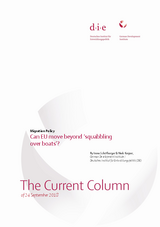The Current Column
Migration Policy
Can EU move beyond ‘squabbling over boats’?
Schöfberger, Irene / Niels KeijzerThe Current Column (2018)
Bonn: German Development Institute / Deutsches Institut für Entwicklungspolitik (DIE), The Current Column of 24 September 2018
Bonn, 24 September 2018. In his recent State of the Union Speech, European Commission President Juncker outlined his vision for the Union’s future migration policy. The speech introduced a package of proposals seeking to strengthen EU competencies on migration, including the eye-catching proposal of a 10,000 person strong Border and Coast Guard. The package seeks to transcend national divisions on migration, which are furthered by nationalist politicians such as Hungarian President Orbán and Italian Deputy Prime Minister Salvini. Yet despite this apparent ambition, the package appears to be inspired primarily by political damage control, and does not set out a longer-term response in the interest of the Union’s own development and its relations with African states. In addition, it does not take into adequate consideration the needs of European and African citizens. Juncker´s proposals focus on issues now at the core of public and political debate. They seek to fill the gaps left by stalled negotiations between EU member states and entail the creation of an EU Agency for Asylum as well as an EU Border and Coast Guard. The first should assist states in the processing of asylum applications. The second should have executive powers to implement border control and return tasks in EU and non-EU countries. Their creation should facilitate the enforcement of stricter rules on return. As a counterbalance to this stricter line, the Commission proposes to create legal pathways for skilled migration and humanitarian resettlement. Progress is expected to incentivise non-EU countries to cooperate on border control and return. Since the 2015 temporary increase in migrants’ arrivals, and despite a recent arrivals drop, European states have struggled to find shared and durable solutions. At this point, little policy progress has been made, with Juncker lamenting that “we cannot continue to squabble to find ad-hoc solutions each time a new ship arrives.” The challenges faced are in fact not new. Attempts to define a common migration policy go back at least two decades. The fact that these attempts have been unsuccessful has surely contributed to the huge political impact of migration. Citizens have turned to nationalism and have expressed a growing distrust in the EU. Perceptions among citizens that the EU is unwilling or unable to deal with the challenge has spread notably in countries where citizens continue to struggle with the protracted effects of the economic crisis, including high unemployment. Juncker´s focus on border control and return is a child of its time. It reflects the way national divisions have led to perceptions of migration as a threat to borders, rather than as an opportunity. Juncker´s proposals reinforces the distinction between refugees, allowed to stay, and other migrants, facing increasing restrictions. This approach ignores that migration is essential both for economic stability in Europe and for resilience and development in Africa. Missing from the proposals are measures that support the migrants´ contribution to transnational development, such as reducing remittance costs. In addition, the proposals do not provide solutions for the many low-skilled migrant workers facing illegal work in sectors such as agriculture, with indirect negative effects on low skilled European workers. Juncker´s proposals also risk hindering effective EU-Africa cooperation. In order to facilitate African cooperation on border control and return, the EU will need to pressure African states further through other external policies. This will be true in particular for development aid. In this way, Europe´s current preoccupation with nationalism will have long-term effects on its relations with Africa. This has so far resulted in short-term approaches and a focus on undefined migration ‘root causes’. The EU is also likely to experience that linking aid allocation to cooperation on border control can backfire in other diplomatic and economic areas. Instead of the proposed haphazard package, likely to be contested, a broader EU approach is needed with regard to cooperation with Africa on migration. The EU needs to shift away from narrow approaches driven by border control and the criminalisation of irregular migrants. Instead, it needs to engage with Africa on a serious discussion of how migration could support development and prosperity in both continents. The African Union would be a good partner to engage with. However, such a shift will only be possible if the EU regains its ability to act internationally as a unique and lucid actor. Unilaterally proclaiming a partnership of equals with Africa, and a new ‘alliance’ that has so far only been discussed with the African Union Chair, is not a convincing expression of that potential. A sustainable migration policy towards Africa requires a whole-of-society approach on both sides, and the EU may only realistically initiate such a process when based on a serious assessment of its internal divisions and threats to societal cohesion.


